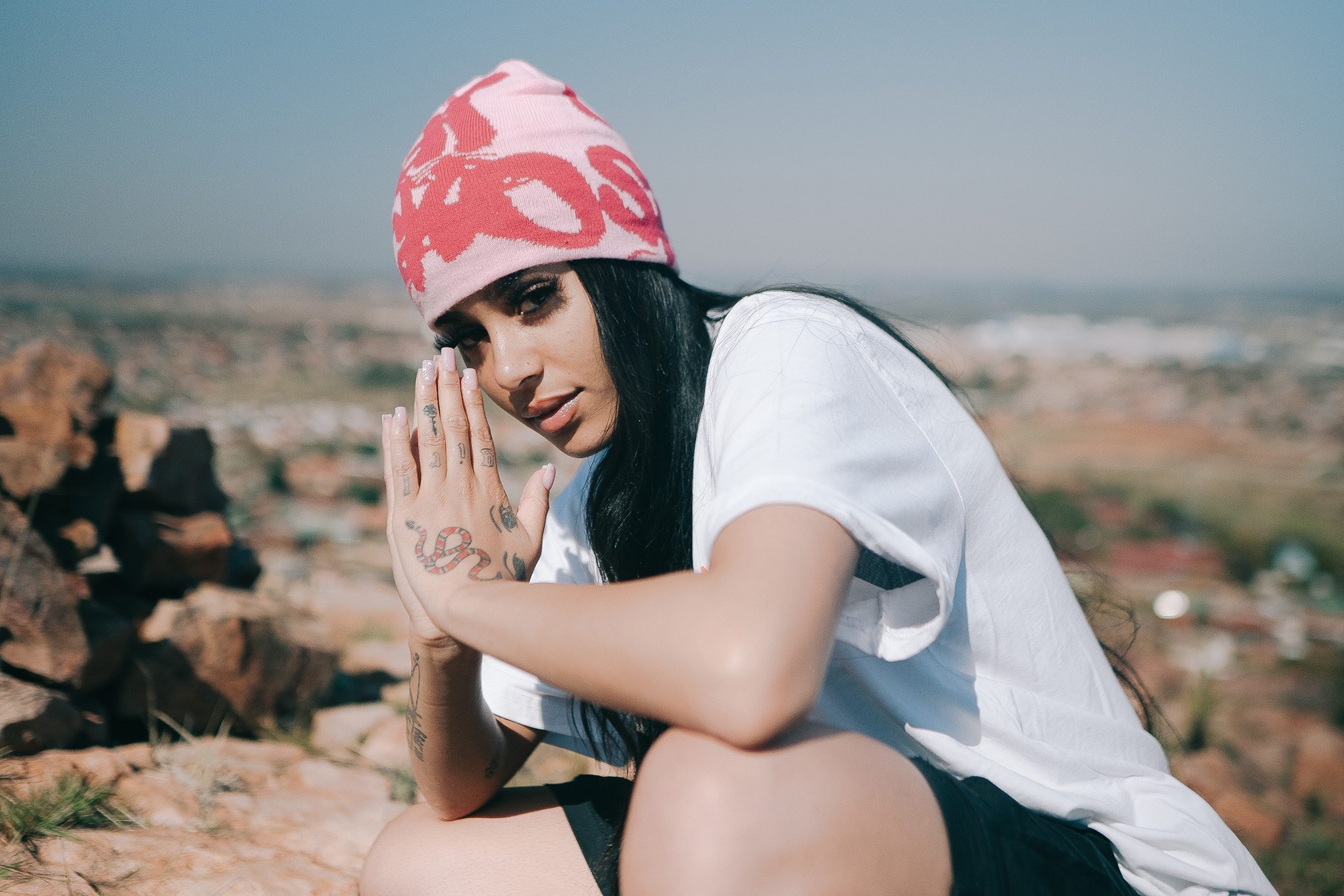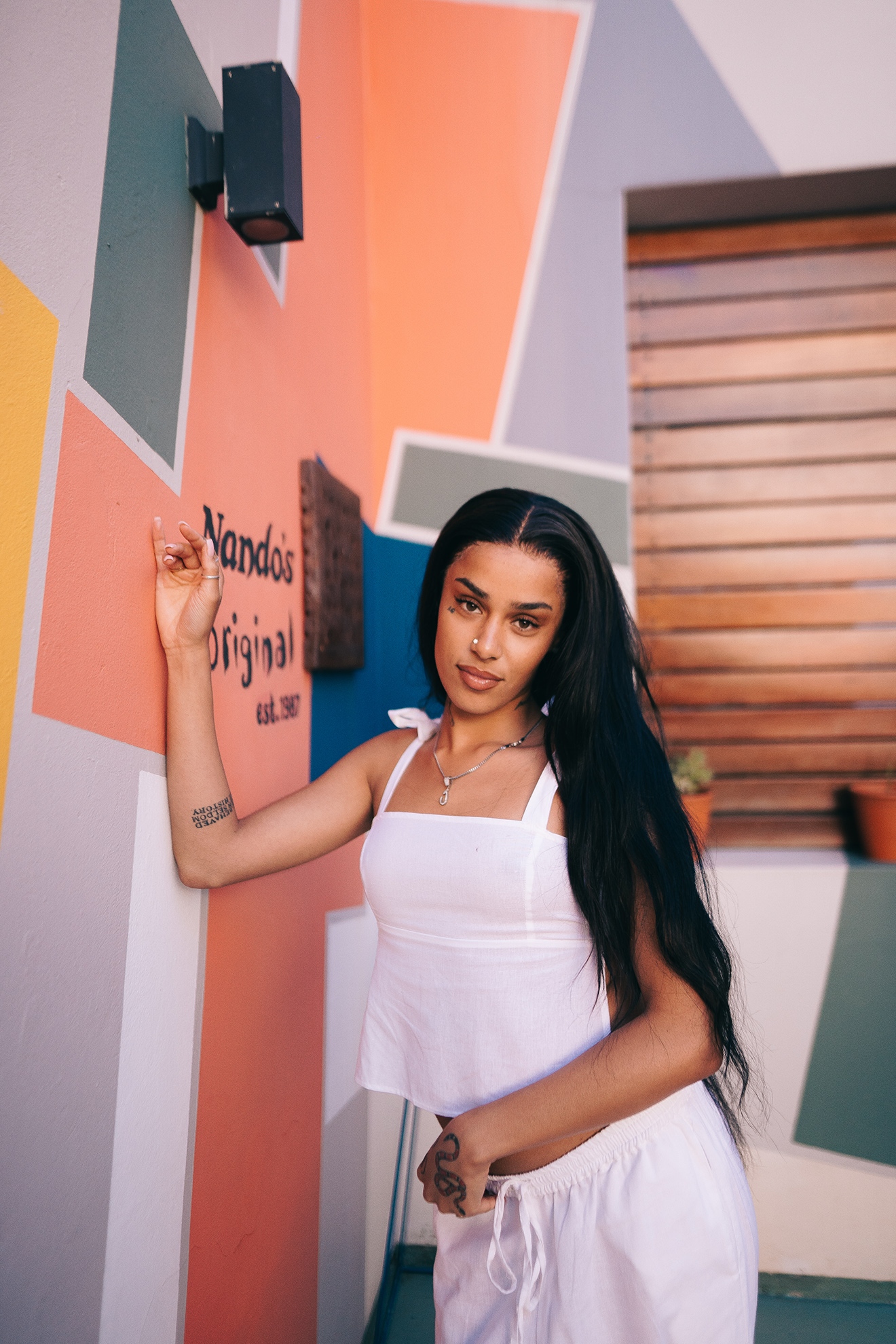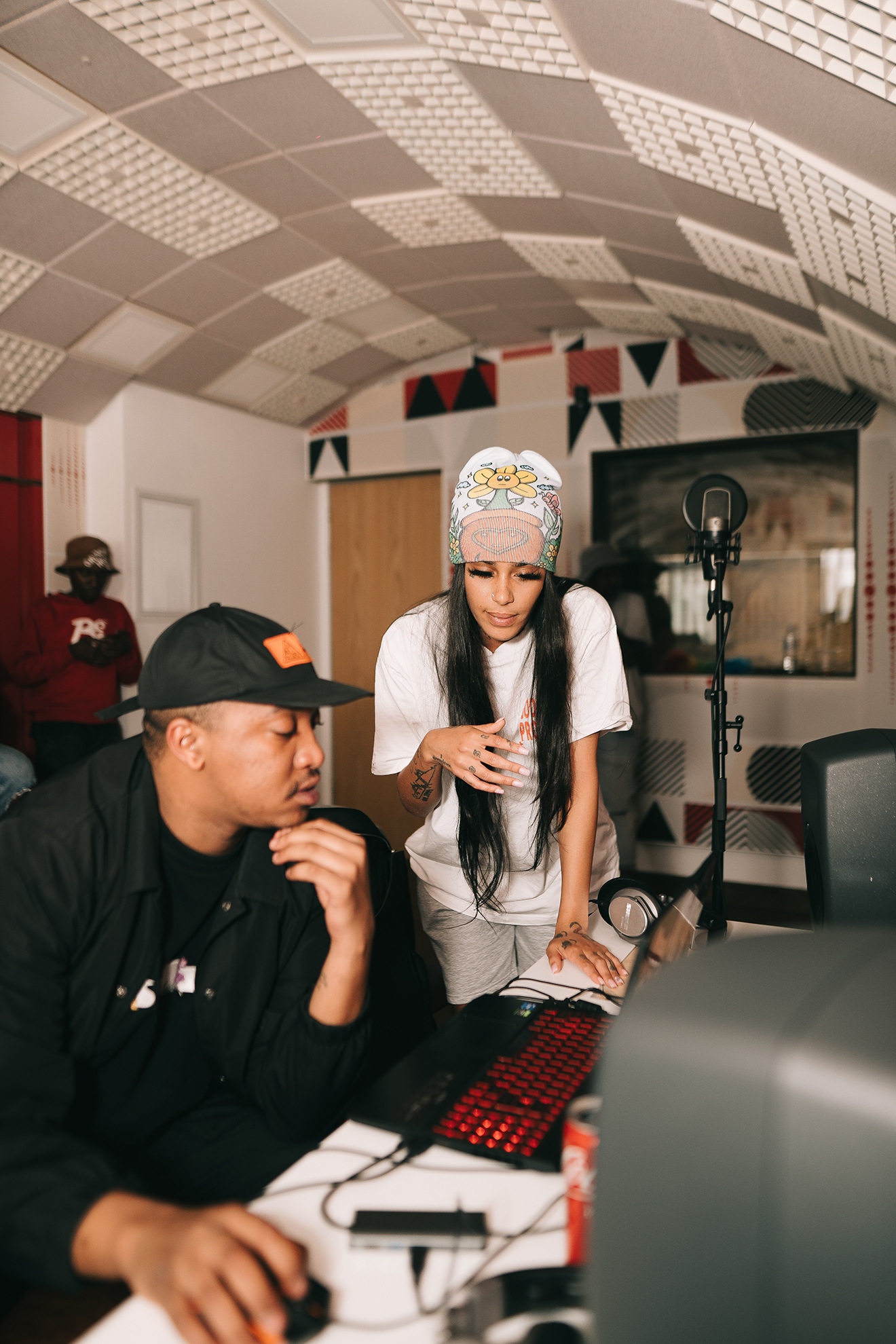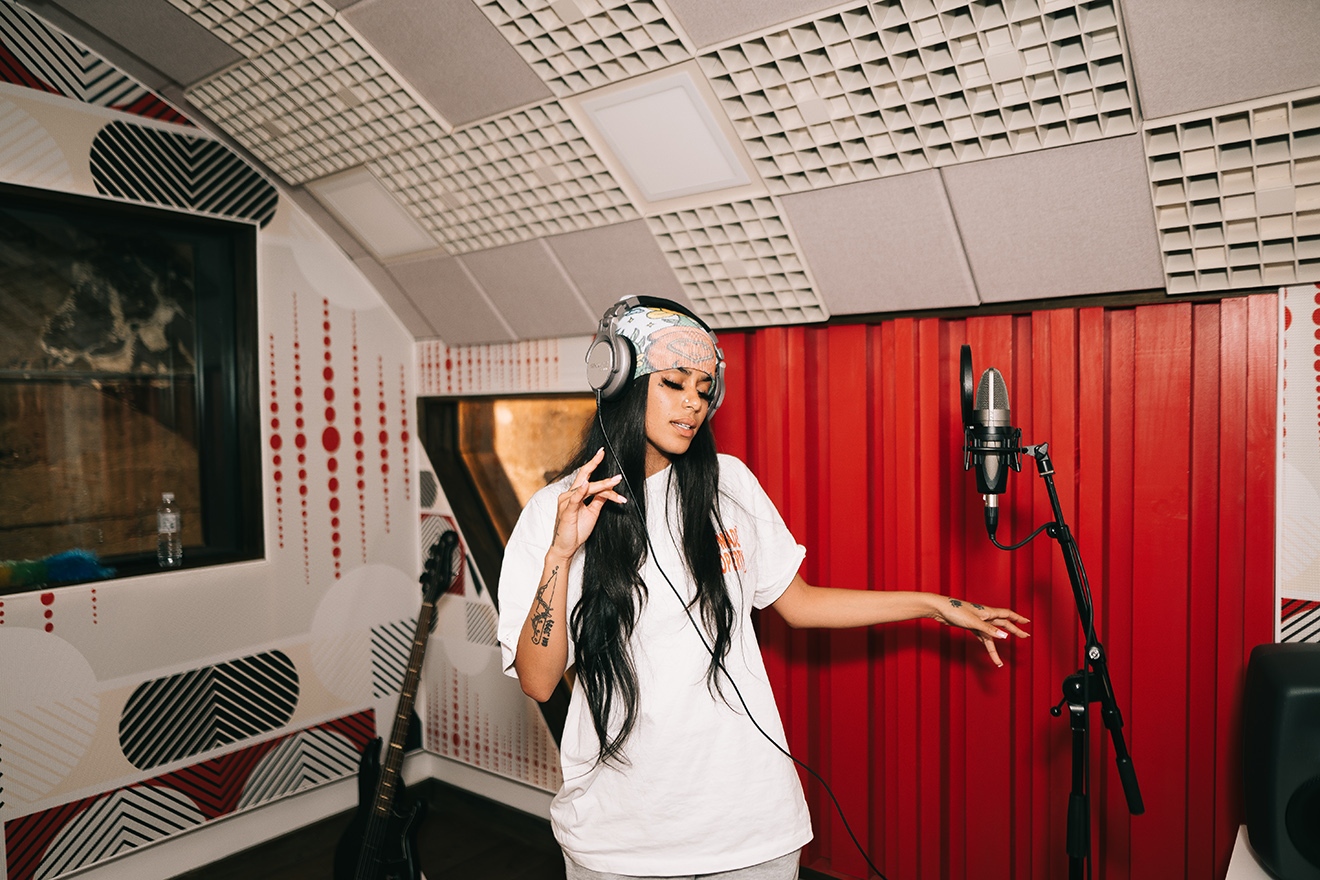 Features
Features
Exploring the homeland of amapiano with Lost Girl
For Nando's Mix It Up project, Lost Girl joined a group of UK music stars on a trip to South Africa to learn about the food, culture, and create unique collaborations in the studio
Exhausted after a long flight from London, Lost Girl doesn’t say much on the first day of her trip to South Africa, but her striking smile makes an appearance during an afternoon photo shoot. She’s here for the 2023 edition of Nando’s Mix It Up project alongside K-Trap, Kojey Radical and Niko B, a four-day cross-continental campaign promoting cultural learning and collaboration between artists from the UK and South Africa - with LuuDaDeejay, Dinho, Mathandos and MFR Souls on production, and vocals from Makhanj.
By the second day, she’s rested and rejuvenated, remaining jovial even after climbing the Magaliesberg Mountain in the Mamelodi West township of Pretoria. Dressed in black shorts, white Godmade Property T-shirt, white Nike socks, pink platform Crocs with a Pink Carsicko beanie, Lost Girl is ever camera ready. When she and Niko B take pictures with the city of Pretoria as their backdrop, she creates a handshake on the spot. Following a group photo with the rest of the artists, Lost Girl asks to be photographed with the locals, who look after the area which they converted from an illegal dumping place to a heritage site in 2001—two years after the Reading native was born.

As we arrive at the legendary Jack Buda, a pivotal venue in the genesis of amapiano, ahead of a panel discussion on the genre’s remarkable rise to global phenomenon, Lost Girl manages to squeeze in practicing a TikTok dance routine before the discussion gets underway. The conversation covers the different iterations/sub-genres of amapiano, from the deep house-leaning private school amapiano to the hard-hitting and bass-driven sgija. “It’s a good thing that the subgenres started, you know,” Force mentions. “That means when you get to an event, you won’t listen to one style the whole night. From 6-til-8:PM, deeper-piano plays; from 8 until 10, it’s private school piano; from 10 until 12, it’s sgija; from 12 until 2:AM, it’s bacardi-piano.” He is right; a typical night out at a club/venue or event with ‘piano DJs on the bill will take you on a similar trip, with songs from most of the styles he refers to getting spins. Sometimes a set from one DJ can range between these varied subgenres—starting with chilled tunes, then building up and ending on a high.
“Would you say ‘private school’ travels further in the world because it's an easier listen?” an attentive Lost Girl asks to the room. Dean and Jackie Queens from Bridges For Music, a non-profit organisation which works to uplift talented young people from under-served communities to fulfil their creative potential which has partnered with Nando’s for the experience, chips in to mention that while the soul-drenched private school amapiano has become prevalent in the past two years, its more mainstream, vigorous sibling has been more commercially viable with greater crossover appeal. “I think what's interesting about this sound is that you can definitely hear people’s different influences in it,” Queens continues, speaking on how malleable and varied amapiano is.
Of all the other UK artists, Lost Girl is the most hip to amapiano. She knows the songs, a few acts, different styles and their nuances, and the viral choreographies. She has a regularly-updated amapiano playlist saved in her Spotify library. “I listen to amapiano all the time. My mum is a big fan; she be running it off in the car. If I’m going to listen to it, then I like to really delve into it,” she remarks as she shows me the playlist on her phone.

As the group heads down the street to Flaka Cloud Restaurant for braai meat (shisanyama as it is known locally) with pap or a bun, she’s comfortable with the surroundings, taking a solo excursion to the liquor store next door to get some rum, which sadly they were out of, before settling on spirit coolers for herself and DJ/partner Portia Walker. “I loved it,” Lost Girl exclaims after I ask her how she found the food. ”I was yamming it. I’ve eaten, I’ll say African [food], 'cause I don’t know [the countries of] the different kinds of food I’ve eaten. My dad is married to an African woman, so I’ve grown up watching them eat different food.” Having been born to a Jamaican father and a Polish-Irish mother, Lost Girl’s background and exposure to multiple cultures make up the person and artist she is today. Her earlier work often blended UK garage with pop sensibilities and her current soundscape straddles between R&B and hip hop.
The singer/songwriter tells me she got sent beat packs by her paired local producer LuuDaDeejay, who has been working closely with the Major League DJz in the past two to three years, and she already has melodies for one of them. While she’s trying to play m some of the beats for me, a nearby Toyota Quantum (a 16-seater minibus used mainly for public transportation) starts blasting Kabza De Small’s ‘Rekere 2’. “This is the kind of stuff I wanna make,” says Lost Girl. Intrigued, I note that the track is rather hard-hitting and ask if she would sing on it, to which she confidently replies, “That’s what I wanna do. You can sing on this. I would definitely make something out of this!”
“Everyone in the UK is on to amapiano now. If you play amapiano in the UK, It’s going off. That’s when people are gonna be like getting up, and everyone is dancing. That and bashment,” Lost Girl reveals. “It’s only a good vibe when it’s playing as well, you know what I mean,” Portia adds. She admits that at first, she didn’t like the genre, but Lost Girl convinced her otherwise. The Quantum continues playing music, and the parking lot in front of the store becomes a party spot. Spontaneously, Lost Girl gets active on the dancefloor and busts a handful of amapiano moves she knows.
At Nando’s Flame Studio in Constitution Hill, where the group are recording their tracks for the 'Mix It Up Vol. 2' EP released through Bridges For Music, Lost Girl’s energy is just as palpable. “I kind of want something a bit more slapping, do you know what I mean? Not too mellow, because I can definitely do mellow, and it can be nice and sing-y, but I want a vibe,” she tells LuuDaDeejay—requesting a hard-knocking instrumental instead. “Let me just see what I can play you,” Luu responds while browsing through his FL Studio project files, As a vocalist who usually records and engineers herself, Lost Girl is particular and knows what she wants or how the song should sound. She asks Luu to rearrange some elements of the beat she chose. Lost Girl is collaborative in the way she works; she immediately goes to get singer-songwriter Makhanj to brainstorm and bounce off ideas. The two then proceed to lay down some magic on the microphone. Seeing that the track is starting to take shape and has direction, Lost Girl even asks me to help create a TikTok dance for it
The next day in the studio, she laces melodies and demos for two other tracks, including a mellow, soulful tune with Makhanj, Chrissy Day, LuuDaDeejay, and Kojey Radical. Lost Girl mentions that this is her regular artistic approach and process; she doesn’t want to rush the songs. “I write and I need to sing melodies into the mic, hear them back, write…,” she discloses of her process. “I’m gonna finish recording both of these when I get back to the UK.”

While we're listening back to one of the tracks, LuuDaDeejay improvises and plays a piano solo through his laptop keyboard, much to the room’s amazement. “This is wild,” Portia shouts, while electrified Makhanj chants, “Washa Piano, dlala (“play”) LuuDaDeejay,” encouraging him to keep going. “This is why it’s called amapiano,” Makhanj informs the room as we gather around him with our cameras out. That moment was reminiscent of the genre’s formative years when many pioneering producers had limited resources, only now with the rest of the world watching. ‘Piano’s global prominence has changed many lives; later that night, the Soweto-born LuuDaDeejay ironically has a flight to the UK for gigs and studio sessions with Major League DJz. “I liked how Lost Girl and I worked. She didn’t take it as just amapiano, but she treated it like any other music genre,” Luu says about the experience before dashing out.
On the last day of the action-packed trip, the group met up at The Playground in Braamfontein. Lost Girl went around the market, viewing the stalls with home-bred art and food on display and for sale. She tries some rice with Durban-style beef curry and spinach and offers the rest of the crew chicken wings. She even questions another UK artist’s decision to have “pizza in South Africa?” At this point, it’s evident she’s fully immersed herself in South African culture and cuisine; the amapiano tracks are not the only thing she’s taking back home with her.
'Mix It Up Vol. 2' is available to pre-save/pre-order here
Madzadza Miya is a freelance writer, follow him on Twitter


